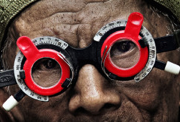The Act of Documenting
by Nicola Popovic
“Art does not make a difference- until it does”
– Werner Herzog talking about Joshua Oppenheimer’s movie, The Act of Killing
3rd of October 2013– The air in the room is unbearably warm after three hours spent watching the director’s cut and following the “questions and answers session” with the director himself, Joshua Oppenheimer. It is an honor to be here and no one seems to want to leave until the very end. I was lucky to get ‘standing-tickets’ as I had not reserved ahead to see the “Act of Killing”, a movie that I had come across only weeks before at the first Human Rights film festival in Myanmar. There, it has been awarded the prize for best movie, which is remarkable in a country run by a military regime until recently.
Now, we are in Berlin and a small German audience gets a preview before a nationwide release in the movie theaters this coming November. The movie is about a group of former death squads leaders allowed to reenact their contributions in the atrocities committed in 1965 and 1966 in Indonesia by the military regime in a documentary they are producing and directing.
This group of elderly men, dressed as Marlon Brando, dancing like Elvis, are demonstrating their identities as free men, narrating their cruel past through different layers of justifications, reflection and regret. The Act of Killing is a movie about a cathartic documentary.
The Act of Killing is about killers who have won, and the sort of society they have built. Unlike ageing Nazis or Rwandan génocidaires, Anwar and his friends have not been forced by history to admit they participated in crimes against humanity. Instead, they have written their own triumphant history, becoming role models for millions of young paramilitaries. The Act of Killing is a journey into the memories and imaginations of the perpetrators, offering insight into the minds of mass killers. And The Act of Killing is a nightmarish vision of a frighteningly banal culture of impunity in which killers can joke about crimes against humanity on television chat shows, and celebrate moral disaster with the ease and grace of a soft shoe dance number.*
While the group of men prepare for shooting the documentary, they first proudly show the spectator how they have used violence and sadism to manifest their power. However, each one of them goes through different stages, trying to justify their responsibility for their acts or to the contrary, recognizing it. By making this documentary, some of them undergo a catharsis, cleansing their souls from the cruelties they document.
One of the main actors – Adi – who flies across the ocean to come and shoot The Act of Killing, explains why he does not fear international legal mechanisms. He states that he perceives himself and his comrades as winners of the armed conflict they once fought. In his opinion, international law is the law of winners, prosecuting the losers of the political conflicts. George Bush nor Barack Obama will ever be prosecuted for their political and military power. According to him, international legal mechanisms are toothless tigers on the leash of the world powers. A simple yet intelligent rationalisation of moral and guilt. In the movie, there are long dialogues between Anwar, the main character, and Adi, about individual responsibility for the acts they committed and how they deal with guilt. While Anwar is haunted by nightmares, Adi does not suffer from bad conscience. He has constructed a very consistent narrative that justifies his actions and involvement in the killings he committed and contributed to.
Anwar’s conscience isn’t as clear. He develops a strong empathy with his former victims through putting himself literally in their shoes. Anwar suffers from nightmares that increasingly reach? to his conscience and make him struggle with his past. As a result, the audience sympathizes with Anwar.
I think that the tradition of cinema gives us one of the most insidious and tantalising ways and stories by which we escape our realities; that we divide the world into good guys and bad guys… and this is a myth. I call it the ‘Star Wars morality’. It’s a myth that there are ‘good guys’ and there are ‘bad guys’. In fact, there are only human beings and human beings can do good things and do some bad things – and all of us do a mixture of both. I think the challenge of The Act of Killing is to get people to cross that boundary. The resistance we have from some viewers is that it asks you to identify and see a small part of yourself in Anwar (the leading character, red.).**
While there are truth and reconciliation commissions, international tribunals in The Hague and disarmament, demobilisation and reintegration programmes for former combatants in different post-conflict countries, Indonesia has not undergone the process of comprehensively dealing with the atrocities committed in the sixties.
This movie and the documentary it is about could be revolutionary for film making, human rights activism, reintegration programmes for war veterans, as well as truth and reconciliation processes, as it reveals that there are several dimensions to accountability. The Acts of Killing shows us how these dimensions could be taken to the next level of collective self-reflection, in a society where self-documentation has become a major part of our collective and individual identity.
The movie is over and even though there are still hands up in the warm air of the theater, the session comes to an end. The audience leaves the four hours long session to lit up a cigaret outside the theater, absorbed, thinking that there are many more questions that could be asked and answered.



Trackbacks & Pingbacks
[…] The Act of Documenting (creatingrights.com) […]
Comments are closed.